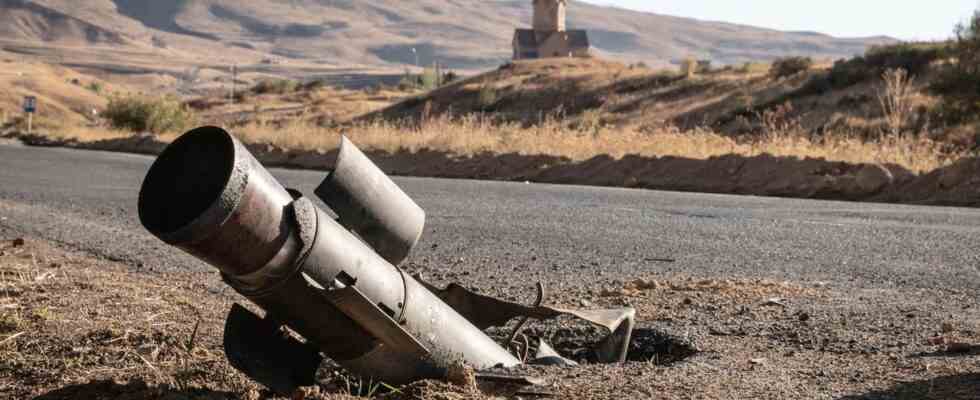Bern Convention
Azerbaijan is suing Armenia over environmental damage in the contested Nagorno-Karabakh region
Remnants of an unexploded missile are sticking out of the ground, contaminating the ground
© Chris Huby / DPA
Armenia is threatened with repair payments in the conflict over Nagorno-Karabakh. Because the opponent Azerbaijan accuses the country of massive environmental destruction in the occupied Caucasus region. A precedent for environmental protection in wartime?
In the tug-of-war over the contested region of Nagorno-Karabakh, Azerbaijan is daring to make an advance in the name of the environment: the country accuses Armenia of massive environmental destruction in the Caucasus region it occupies. Azerbaijan now wants to sue the opponent for contamination of water, deforestation and destruction of biodiversity, citing the Bern Convention of 1979. Armenia has also signed the international treaty of the Council of Europe and, together with 49 other countries, has committed itself to protecting wild plants and animals and to preserve their habitats.
Azerbaijan is now suing the occupiers for allegedly violating the Bern Convention and “blocking and ignoring” 18-month efforts to find a diplomatic solution to the conflict, says Deputy Foreign Minister Elnur Mammadov. “Instead of preserving biodiversity and the environment during its illegal occupation, Armenia destroyed them. We were therefore left with no choice but to hold Armenia accountable for its irresponsible environmental damage.”
An international tribunal is to examine evidence of environmental destruction. It is the first time that a country has sought intergovernmental arbitration under the Bern Convention. If Azerbaijan is right, the court decision could set a precedent for more attention being paid to environmental degradation and biodiversity protection in wars. Meanwhile, Armenia has to reckon with repair payments. The country has so far remained silent on the allegations.
Azerbaijan accuses Armenia of destroying biodiversity
According to information from the Ministry of Ecology and Natural Resources in Azerbaijan, more than 7,000 hectares of protected forests in Nagorno-Karabakh have been damaged. Rare species such as Caucasian leopards, brown bears, gray wolves and Steppe eagles live there. According to the nature conservation organization WWF, 50 animal and plant species are on the “red list” in the Caucasus region. They are threatened with extinction worldwide. “I guess there isonly 40 to 60 Caucasus leopards (Persian leopards) left, and the populations of their prey species are also dramatically low,” writes the WWF.
Originally, the reserves and nature reserves were established to protect the delicate ecosystem. Armenia is said to have cut down 2000-year-old trees there.
According to Azerbaijan, mining is to blame for the ecological overexploitation. According to the WWF, this and the construction of hydroelectric power plants in the Caucasus mostly do not meet international environmental standards. They are usually not only near nature reserves, but also right in the middle of them.
heavy metals in water bodies
The United Nations Environment Program has already complained about serious damage in the contested region. According to a report from last year, lands used for agriculture and water supply are particularly badly affected. However, the report does not refer to the damage caused by Armenia, but to the total war damage in the Nagorno-Karabakh conflict. To this day, livestock and wild animals are still dying from landmines. Soil and water are contaminated by heavy metals and explosive residues.
In 2021, Azerbaijan had the Okhchuchay River examined. High concentrations of heavy metals such as cadmium, lead, nickel, iron, molybdenum and zinc were discovered in the water. According to the information, several protected fish and amphibian species are threatened. The country accuses Armenia of polluting the river with sewage. But environmental and civil society organizations are also concerned about the state of the water, according to the UN report. Studies by Armenian scientists gave the Okhchuchay a similarly poor result as in Azerbaijan.
Pay more attention to environmental damage in war
The example shows that environmental destruction and its consequences through wars are given greater consideration, say British lawyers. This could also affect the Russian war of aggression in Ukraine. In December, the UN General Assembly agreed on 27 legal principles to protect the environment in armed conflicts.
Azerbaijan and Armenia now have three months to appoint arbitrators to review reported environmental damage. If Azerbaijan wins the case, it would be the first time that an arbitral tribunal has decided on damages for environmental damage in the war.
Sources: “The Guardians“, UN report on the environment program, APA, WWF, Federal Environment Ministry


